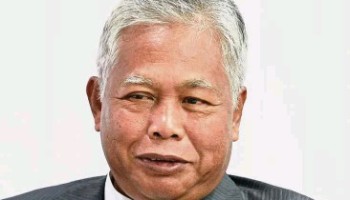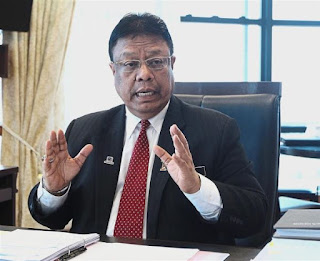
Prized job: While long-term security like the pension scheme free healthcare and easy loans have been among the perks of joining the public service, many job seekers now want to become civil servants because it pays well. — Bernama
The attractive emoluments and benefits in the public sector are costing the country, say experts.
THE civil service had never been *Sofea Mohd’s dream job but in the current competitive job market, the final year Economics student at a local public university is seriously weighing the option. Especially since she was offered a temporary position at a ministry where she had just completed an internship.
“My seniors advised me to take the offer – one said she had to wait years before she got a job, another said he had to work in a fastfood restaurant and sell pens and children’s books on the street, so I thought I should listen to them and just take it.
“They say my chances of being hired permanently will be higher then,” says the 22-year-old.
The main reason she decided to accept the offer, however, is the pay, she tells, “It’s not as low as people say. I will get a daily wage but I can earn at least RM2,000 a month. The pay for permanent staff is of course better.”
Her friend *Azman Jailani
dreams of starting his own business but is also planning to join the public sector after graduation.
“That’s what my parents want me to do. They say there is more security in the civil service. I can start my business later if I want,” says the final year business studies student.
With the academic year coming to a close at most tertiary institution in the country, many graduating students are preparing for the next chapter in their life. And like these two, many are looking at the civil service for a job guarantee.
It was reported recently that the Public Service Commission received 1.56 million applications last year to fill 25,046 job vacancies in the public sector. In 2015, the PSC received 1.63 million applications for 24,606 vacancies.
While the attraction of a government job is well-noted – long-term security; a pension scheme; cheap, if not free, healthcare; easy loans – many job seekers are now drawn to the public sector because of its pay.
Shamsuddin: ‘Duplications impact the private sector. When there are too many agencies, that will bound to cause delays.’
The pay for the public sector, especially for entry-level jobs, is on par with the private sector, says Malaysian Employers Federation (MEF) director Datuk Shamsuddin Bardan.
“It has to be noted that public sector wages have risen, in some cases outstripping the wages in the private sector. And that is only the basic pay. When you add the different allowances and bonuses, the public sector’s salaries – perhaps except for those at senior management level – could be more attractive than that of the private sector.
“Then there are also many benefits for civil servants such as house loans and healthcare benefits for them and family that continue even after they retire.
“In the private sector, the health insurance coverage ends when you leave a company’s employment or retire,” he says.
But the attractive emolument and benefits in the public sector have come at a price for the country, say economists, one that Malaysia will not be able to afford in the future. In fact, some believe it is already hurting Malaysia’s economy – it has been reported that it will now cost the nation more than 40% of government revenue to maintain the public sector.
Experts have pointed to its sheer size as a reason for the burgeoning bill of the civil service.
In February, Second Finance Minister Datuk Seri Johari Abdul Ghani told a local Chinese daily in an interview that it is a growing challenge for the Government to run the public sector due to the rising costs.
“One of the issues that we have to address is the ever-increasing government operating costs and expenses.
“For example, we have about 1.6 million civil servants, which is one of the world’s largest proportion of civil service,” Johari was quoted as saying.
With a population of 31 million, this means Malaysia has a ratio of one civil servant to 19 people, said the news report, which cited corresponding ratios for other countries in comparison: Singapore (1 to 71 people), Indonesia (1:110), China (1:108) and Britain (1:118).
The reported size of the civil service caused a stir, with the Public Service Department director-general Datuk Seri Zainal Rahim Seman refuting criticisms that the civil service is oversized by reiterating Chief Secretary to the Government Tan Sri Dr Ali Hamsa’s statement that the size of the civil service is a matter of definition under the Federal Constitution, which includes the police, the armed forces, and healthcare and education personnel.
As Zainal Rahim told the press, the actual size of the civil service would only be 682,790 should Malaysia adopt the same calculation used by other countries. This would make the ratio of civil servant to population as 1 to 44, instead of 1:19, he said.
The Organisation for Economic Co-operation and Development, meanwhile, put Malaysia’s employment in the public sector as only 10.8% of the total labour force in 2013.
But as Johari highlighted, the fact is, emoluments make up the biggest portion of the Government’s operating expenditure, and that cost has been and will keep expanding.
“In 2003, the pay of public servants totalled RM22bil but it increased to RM74bil by 2016. In 2003, the pension of civil servants was RM5.9bil and in 2016 the amount soared to RM19bil.”
This year, some RM77.4bil have been allocated in the 2017 Budget for public servants’ pay and some RM21bil for the pension and gratuity payments of retirees, which is about 45% of the allocated operating expenditure of the country.
The challenge to cover the spiking cost is intensified by the declining Government revenue, the vernacular newspaper reported Johari as saying.
“In particular, revenues from the palm oil and natural gas industries, which generated profits of about RM65bil in 2014, fell sharply to RM30bil in 2016,” he was quoted.
Concurring, economist Dr Yeah Kim Leng says the rising operating expenditure is also a concern due to its impact on the country’s development.
“Over the last decade or so, we are seeing the operating expenditure in the government budget expand to the extent that we are not able to expand the development expenditure,” says Dr Yeah, who is an economics professor at Sunway Business School.
Some RM214.8bil was allocated for operating expenditure in the 2017 Budget while only RM46bil was allocated for development.
“By right, the development expenditure should be half of the budget if we want a dynamic economy as we see in many countries, especially in the developed countries,” he adds.
“But in Malaysia, the development expenditure has shrunk to as low as 20% of the budget. This will have a multiplier effect on our economy.”
He argues we should be spending more on our development, both in increasing the quantum of development expenditure and at the same time focusing the development expenditure on the right sectors – not just hard infrastructure but also soft infrastructure like social and human capital development.
“This is important in improving the quality of our workforce and their skills, in terms of boosting the talent development that can push the frontiers of growth in the country, especially in science and technology and other emerging knowledge and industries.
“The Government needs to attract investments in these new sectors, so that is why development expenditure is one of the key contributions to spark growth in those sectors and accelerate the growth of the economy towards becoming high end, high value.”
He points out, various studies have shown that the country’s civil service is big, with a low productivity rate.
“Regardless of how we calculate the total, we definitely have more people in the public sector than necessary, and studies have shown that labour productivity is quite low for the public sector.”
Rightsizing the civil service is the way to go, he asserts, but it should be treated as part of the continuous effort of improving the efficiency of its delivery service.
“The key is to be able to provide the services required by the people optimally, which is at the smallest number and lowest cost possible without sacrificing the quality of service,” he says, stressing that the underlying note is that “we should be getting bigger banks for our bucks, that is the taxpayers’ money.”
Crucially, Dr Yeah adds, while rightsizing the civil service is important to sustain growth, it is important that we rightsize without disrupting economic growth in terms of the employment situation in the country.
“We have to ensure meaningful employment for all while sustaining a low unemployment rate so that we can maintain the domestic economic growth momentum.”
Any prudent government would seize the opportunity to rightsize and enhance the public sector efficiency, Dr Yeah says.
“It is important to rightsize gradually and incrementally at a pace that does not disrupt the economy.
“Because the risk is that if we are hit by a downturn and the government is forced to undertake the pending cuts then that would be more painful and damaging to the economy. There would be a loss of productive capital when we face that kind of situation,” he says.
Tan Sri Mohd Sheriff Mohd Kassim, immediate past president of the Malaysian Economic Association (MEA) also believes it is time for Malaysia to rightsize the civil service due to the huge sum of civil servants’ salaries and pensions in the government expenditure.
As he had told the “Economic Governance: Public Sector Governance” forum in February, it could be a problem for Malaysia if it runs into a financial crisis and rightsizing is “better sooner than later” if Malaysia wanted to avoid falling into a Greece-like crisis, where the European country had to cut salaries and state pensions for its civil service.
“It is worthwhile to do it now while we can still afford it.
“I think we should do it gradually. It is kinder to do it now with incentives than to suddenly cut their salaries and pensions at a time when they can least afford it,” he was reported as saying.
Mohd Sheriff, who is also the former Finance Ministry secretary-general and Economic Planning Unit director-general, points out that there are ways of rightsizing in a humane and caring manner including providing free courses on skills development that will make people employable in the right sector like ICT, English, basic accounting, corporate law and others.
He says with the right skills, many would even leave the service on their own accord to improve their lives.
Dr Yeah agrees.
“While their pay is comparable to the private sector, many of the second layer and support jobs in the civil service have low long-term prospect,” he says.
“If their skills are improved, they and their families could get better prospects for the future. And if they are forced to look at other opportunities in the private sector or in entrepreneurship, in the end they could be better off,” he says, pointing to some of the initiatives already taken to rightsize the civil service and improve its productivity and efficiency, especially under Pemandu.
Dr Lee Hwok Aun, senior fellow at the Institute of Southeast Asian Studies in Singapore, says the Government should explore different ways to raise more revenue, such as by introducing a capital gains tax.
As a former lecturer at a Malaysian public university, Dr Lee says he can appreciate the enormous difficulty of rightsizing the civil service.
“The projected increasing burden of civil service salaries and proven continuous increase of operational expenditures in overall federal government spending, at the expense of investment, are major causes for concern. And the size of the civil service matters, but the long-term issues are even more complex,” he says.
For the civil service to be effective, nimble and efficient, it will need to attract and retain talent in certain sectors – which means paying higher salaries, especially for key positions such as teachers, he says.
As he sees it, the main problem is over-bureaucratisation.
“There are various unnecessary administrative posts, which add cost and tend to perpetuate procedures and heavy paperwork. I can attest to this from my experience working in a public university. An overhaul of administrative strategy and operations is probably necessary in many departments, before making any staff reductions. If not, when staff retire or relocate, the same amount of tedious work becomes distributed among fewer people, causing service and morale to decline,” he says, adding there will also be resistance from civil servants who stand to lose their pension if they leave.
“We should be understanding and merciful about this situation. Forms of compensation, or the option to convert from public sector pension to an EPF lump sum, could be explored.”
MEF’s Shamsuddin concurs, pointing out that there are also a lot of duplications of service and work at the federal level and state level and so on.
“A good example is tourism where there is a tourism agency at the federal level while the state has its own tourism Exco and office.
Duplications impact the private sector as it is a problem to deal with different government agencies to get something done. When there are too many agencies, that will bound to cause delays,” says Shamsuddin.
Dr Yeah says it is imperative for the Government to enhance the efficiency of the delivery service and effectiveness of the public sector across the board, such as putting them to work in priority areas and where they will have the highest impact.
“Crucially, when we focus on improving productivity through redeployment, retraining and re-skilling, quite naturally, we will be rightsizing.”
It can even be a win-win situation for the public servants as a smaller number of employees that commensurate with a higher productivity will mean an increase in profit, so the civil servants can receive higher wages, he notes.
Still, Dr Yeah feels the public sector’s emolument bill should be capped.
“We need to ensure that the public sector wages do not exceed the workers’ productivity or rate of inflation, as that itself will lead to a productivity decline.
“We should cascade it so that the wages in private sector could rise in tandem with thepublic sector,” he says, adding that at the same time the size of the civil service needs to be reduced. “If we don’t rightsize and instead create more civil service jobs, it will be a downward spiral.”
The Government also needs to enhance Malaysia’s investment climate and attract more foreign investments, he adds, “The strategy of the country should be to push for private sector growth, especially in new and emerging areas which would boost demand for highly skilled labour.”
Ultimately, says Dr Yeah, the public service sector should not be the job reserve or employer of the last resort in the country.
To achieve this, we need to stop the disproportionate interest in the public sector which is not healthy for the economy, he says.
“We should be steering the workforce towards the private sector or they should become entrepreneurs so that they can raise their income opportunities and create jobs.”
The tightening of the job market can lead to higher investment, higher productivity and higher wages, Dr Yeah notes, “This is the virtuous cycle we need to kickstart to sustain an economic growth for the country at a higher level.”
*not real name
Next: Some of the initiatives already taken by the Government to rightsize the civil service and improve its productivity and efficiency.
Source: The Star/ANN by Hariati Azizan
Related Links:
Ministers may face conflict of interest,
says Tunku Abdul Aziz: "If you have no power, you cannot abuse it.
Civil servants hav...
tide in their
respective countries, who can? ...


































